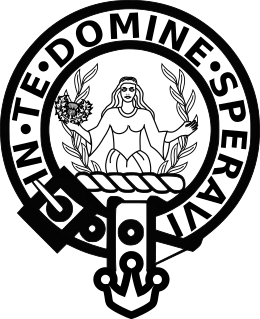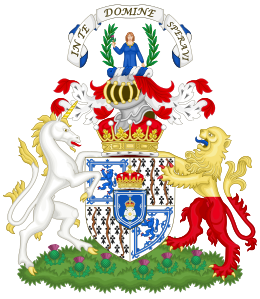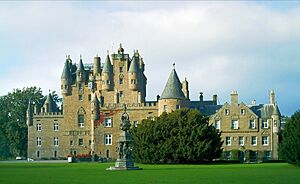Clan Lyon facts for kids
Quick facts for kids Clan Lyon |
|||
|---|---|---|---|

Crest: Within a garland of bay leaves, a lady from the middle richly attired, holding in her dexter hand a thistle all Proper (in allusion to the alliance of Sir John Lyon with Princess Jean, daughter of King Robert II).
|
|||
| Motto | In Te Domine Speravi (In thee o Lord have I put my trust) | ||
| Profile | |||
| Region | Lowlands | ||
| Chief | |||
 |
|||
| Rt Hon Simon Patrick Bowes-Lyon | |||
| 19th Earl of Strathmore and Kinghorne | |||
| Seat | Glamis Castle | ||
|
|||
|
|||
|
|||
Clan Lyon is a historic Scottish clan. Clans are groups of people who share a common ancestor and a strong family bond. The Clan Lyon has a long and interesting history in Scotland.
Contents
History of Clan Lyon
Where the Clan Lyon Came From
Some historians believe the Lyon family came from a French family called de Léon. They arrived in Scotland around the year 1100. This was during the time of Edgar, King of Scotland. The de Leons helped King Edgar fight against his uncle, Donald III of Scotland. After Edgar won, the de Leons were given lands in Perthshire. These lands were later known as Glen Lyon. In 1105, a man named Roger de Leonne was a witness to an important document from King Edgar.
Important Events in the 14th, 15th, and 16th Centuries
Robert II of Scotland gave land called Glamis to Sir John Lyon. Sir John was known as the White Lyon because of his fair skin. Five years later, he became the Chamberlain of Scotland. This was a very important job, managing the king's household and money.
Sir John Lyon married Princess Jean Stewart, who was King Robert's daughter. This marriage brought him more land. He also received the area of Kinghorn. Sadly, Sir John Lyon was later killed in a fight with Sir James Lindsay of Crawford.
Sir John Lyon's son, also named John Lyon, continued the family's strong ties to the royal family. He married a granddaughter of King Robert II. John's son, Patrick Lyon, was made Lord Glamis in 1445. He became the Master of the Household of Scotland and a Privy Councillor. This meant he was a trusted advisor to the king. Earlier, in 1424, he had been sent to England as a hostage. This was part of a deal to free James I of Scotland from being held captive.
John Lyon, 6th Lord Glamis was known for being quick-tempered. He married Janet Douglas, Lady Glamis. After her husband died, Lady Glamis faced great trouble. James V of Scotland disliked the Douglas family very much. Lady Glamis was falsely accused of witchcraft. Even though she bravely defended herself, she suffered a terrible fate in Edinburgh in 1540. Her young son was also in danger, but the king died before the boy grew up. So, he was released and avoided harm. The king had taken over Glamis Castle and taken many valuable things from it.
John Lyon, 8th Lord Glamis stopped supporting Mary, Queen of Scots. Instead, he served under the Regents Moray and Lennox. A Regent is someone who rules when the king or queen is too young or unable to. The 8th Lord became the Lord Chancellor of Scotland. This was the highest legal position in the country. He was also the Keeper of the Great Seal of Scotland. The 9th Lord Glamis was the captain of the Royal Guard. He was also a Privy Councillor to James VI of Scotland. In 1606, he was given the titles Earl of Kinghorne, Viscount Lyon, and Baron Glamis.
The 17th Century and the Civil War

John Lyon, the 2nd Earl of Kinghorne, was a close friend of James Graham, 1st Marquis of Montrose. In 1638, Lyon joined Montrose in signing the National Covenant. This was an important document about religious freedom in Scotland. Lyon supported Montrose in his early fights for the Covenant. However, he did not support Montrose when he decided to fight for Charles I of England. Because of this, Lyon's family lands were almost ruined from supporting the Covenanter army.
Patrick Lyon, 3rd Earl of Strathmore and Kinghorne, worked hard to pay off the family's debts. He was also able to make Glamis Castle much bigger and grander.
The 18th Century and Jacobite Risings
The 3rd Earl's son, John Lyon, 4th Earl of Strathmore and Kinghorne, was a member of the Privy Council. But he was against the 1707 Treaty of Union. This treaty joined Scotland and England into Great Britain. During the Jacobite rising of 1715, his son was a Jacobite. Jacobites supported the return of the Stuart kings to the throne. His son fought at the Battle of Sheriffmuir and bravely died defending his regiment's flag. James Francis Edward Stuart (also known as the Old Pretender) stayed at Glamis Castle in 1716. Today, you can still see a sword and watch that belonged to him at the castle.
During the Jacobite rising of 1745, the Duke of Cumberland stayed at Glamis Castle. This was on his way to the Battle of Culloden. People say he was not very welcome there!
Clan Chiefs
The current chief of Clan Lyon is Simon Patrick Bowes-Lyon, 19th Earl of Strathmore and Kinghorne. The Lyon family has had many chiefs over the centuries, leading the clan through its long history.
Clan Castle
The main home of the chief of Clan Lyon is Glamis Castle. This famous castle is located in Angus, Scotland.
 | Ernest Everett Just |
 | Mary Jackson |
 | Emmett Chappelle |
 | Marie Maynard Daly |

